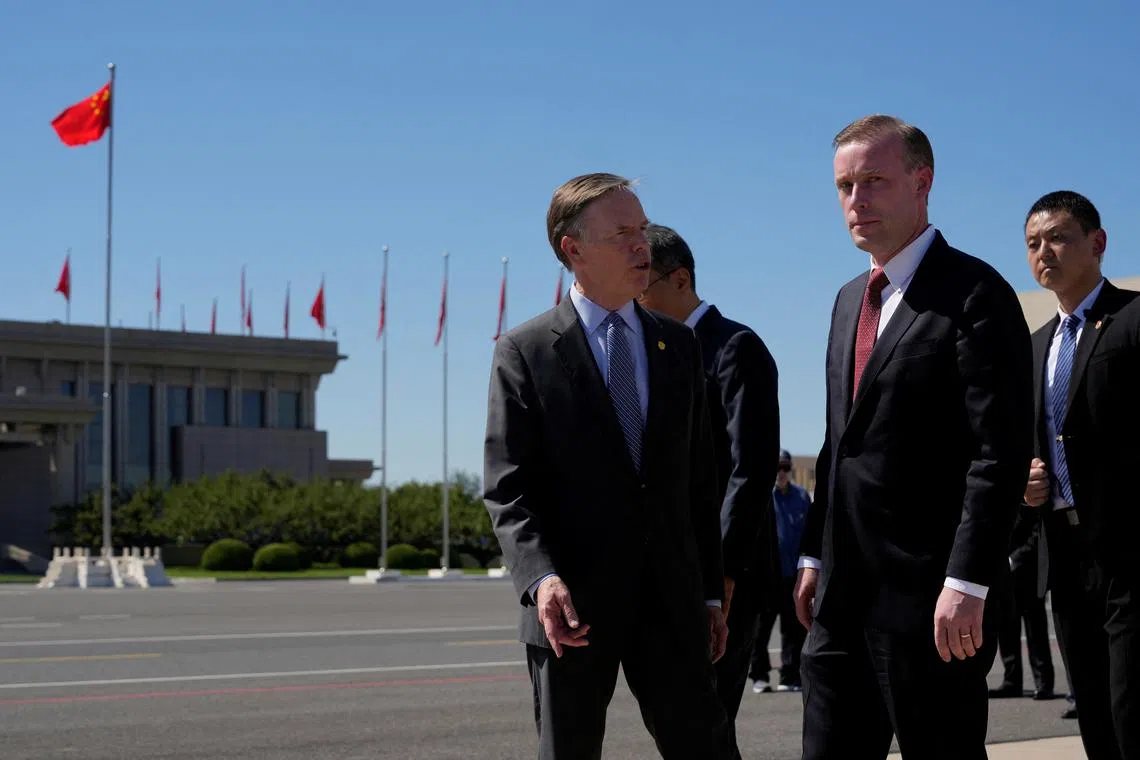Top Chinese, US officials hope for productive talks in Beijing
Sign up now: Get insights on Asia's fast-moving developments

Mr Jake Sullivan’s trip to Beijing is the first by a US national security adviser since 2016.
PHOTO: REUTERS
BEIJING – US National Security Adviser Jake Sullivan and China’s top diplomat Wang Yi said on Aug 27 that they were hoping for productive talks as they met in Beijing.
Washington allies Japan and the Philippines have blamed China in the past week for raising regional tensions, with Tokyo accusing Beijing of violating its airspace the “biggest disruptor” of peace in South-east Asia
Mr Sullivan said after he arrived in the Chinese capital on the afternoon of Aug 27 that he looked forward to “a very productive round of conversations” with Foreign Minister Wang.
“We’ll delve into a wide range of issues, including issues on which we agree and those issues... where there are still differences that we need to manage effectively and substantively,” he said.
Mr Wang told Mr Sullivan he was keen for “substantive” and “constructive” talks during his visit, the first to China by a US national security adviser since 2016.
He also said he wanted the two sides to “help China-US relations move forward towards the San Francisco vision”, referring to a framework hashed out by presidents Joe Biden and Xi Jinping during talks in the US city last year.
Tokyo expressed “serious concern” on Aug 27 over recent developments in the South China Sea, accusing Beijing of “dangerous and coercive” actions.
In a show of support for Manila, Tokyo said it “highly appreciates the government of the Philippines for having... shown its commitment to the peaceful settlement of disputes” in the region.
An American official said ahead of the visit that Mr Sullivan would discuss the disputed waterway with his counterparts in Beijing, including Mr Wang.
She did not indicate whether any breakthroughs were expected on the trip.
“We are committed to making the investments, strengthening our alliances, and taking the common steps on tech and national security that we need to take,” the official said, referring to sweeping restrictions on US technology transfers to China imposed under Mr Biden.
“We are committed to managing this competition responsibly... and preventing it from veering into conflict,” she added, speaking on condition of anonymity.
She also said the US would press China over its mounting “military, diplomatic and economic pressure” on Taiwan, the self-ruling democracy that Beijing considers part of its territory and has not ruled out reunifying through force.
China has kept up its sabre-rattling since the inauguration this year of President Lai Ching-te, whose party emphasises Taiwan’s separate identity.
“These activities are destabilising, risk escalation, and we’re going to continue to urge Beijing to engage in meaningful dialogue with Taipei,” the US official said.
Managing tensions
Mr Sullivan will also reiterate Washington’s concerns about China’s support for the expansion of Russia’s defence industry since its invasion of Ukraine.
Beijing counters that, unlike the United States, it does not give weapons directly to either side.
China has been eager to work with American national security advisers, seeing them as decision-makers close to the president who can negotiate away from the media spotlight that comes with the secretary of state or other top leadership.
The modern US-China relationship was launched when the late Henry Kissinger, then national security adviser to president Richard Nixon, secretly visited Beijing in 1971 to lay the groundwork for normalising relations with the communist state.
Mr Sullivan and Mr Wang have met five times over the past year-and-a-half – in Washington, Vienna, Malta and Bangkok, as well as alongside Mr Biden and Mr Xi at the November summit in California.
Those meetings between Mr Wang and Mr Sullivan were sometimes announced only after they concluded and the two had spent long hours together behind closed doors. AFP


